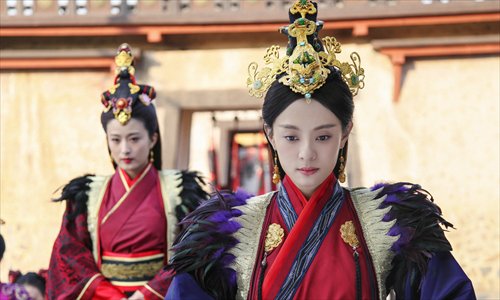Poor showing for ‘Legend of Mi Yue’ reveals a demand for higher quality TV

A still from The Legend of Mi Yue
More than four people have come to me recently, asking if I'm a descendant of the ancient kingdom of Chu because of my family name, Xiong, is the same as the kingdom's rulers. At first I thought it was pretty strange that so many people would ask me the same question, then I realized the reason behind it: the controversial TV series The Legend of Mi Yue. The show's main character is from this kingdom and is the first woman to attain strong political power in China.
Directed by the director behind the highly acclaimed The Legend of Zhen Huan and featuring the same lead actress, the show was highly anticipated, yet it hasn't been the critical hit audiences thought it would be. While the show is still performing well when it comes to viewership ratings, its score on media review site douban.com has dropped from the 8/10 it held before release to a 5.5/10.
It seems the more people looked forward to the show, the more disappointed they feel. Many people who have scored the show low have said they were fans of The Legend of Zhen Huan, but they feel that stories involving court intrigue between queens and concubines no longer feel fresh.
Attention to detail
While the show's director Zheng Xiaolong has emphasized that the story in Mi Yue is different from Zhen Huan in that it involves a woman who attains political power, the first third of the show that has been released so far still sees the main character Mi Yue struggling with her sister Mi Shu over the affection of the King of Qin. With none of the promised political angles seen so far, audience discussion has moved on to other elements seen in the series such as the historical clothing, food and medicine. It seems that many people online have suddenly become experts of history and culture overnight as they are constantly criticizing the mistakes made in this TV series. If anything, the show has at least sparked people's passion for studying up on the history of China before the Qin Dynasty (221 BC - 206 BC).
One of the first historical lessons the show has provided has to do with the name of the main character, 芈 (mi), which is a Chinese character that is rarely used in modern times. While early promotional materials for the show focused on teaching people how to pronounce this character, viewers now seem to have become more interested in the origins of this family name and in turn the origins behind their own surnames.
Originally Chinese surnames could be divided into clan names and lineages names. Mi is actually the clan name for the Chu royal family and was usually used by women, while the lineage name of Xiong was used by men. So when the show sees men using the clan name Mi, it rubs the audience the wrong way.
Many audiences have also pointed out that many famous historic figures, such as the famous poet Qu Yuan or the prime minister Huang Xie, who are appearing in the show were not even born during the time period when the show takes place, as such it would be impossible for them to teach or have a relationship with the heroine. Other historical inaccuracies abound, such as the use of paper, which is something that would not appear for another 100 years.
The show has also gotten the clothing and hair from this time period wrong. Chu nobles during the Warring States period (475 BC - 221 BC) chose dark colors and wore jade jewelry to mark their social position, far different than the bright clothing adorned with feathers that is seen in the show.
In an interview with qq.com, Zheng defined this series as a "historic legendary drama" that got the big events right, while playing loose with smaller details. However, this creative choice seems to not be sitting well with audiences who have suddenly developed a passion for culture and history.
Women in authority
The Legend of Zhen Huan and its depictions of palace intrigue among concubines was a great success in 2011.
In recent years, more TV series and films focusing on the growth of female characters have made it small and large screens. From modern dramas such as The Good Wife, House of Cards and Veep to period shows such as Reign and The White Queen, it seems to have become an international trend to depict women in high level political roles.
Yet China seems to be constantly fumbling when it comes to this trend. In January, the Chinese series The Empress of China starring Fan Bingbing received a low score of 5.4 on douban.com because it portrayed Wu Zetian, China's one and only female emperor in its entire history, into a naive and innocent girl.
Looking at female characters in recent shows Daenerys Targaryen is probably a much better example than Mi Yue. Both women were forced into political marriages, but Daenerys focuses on making her husband see her as an equal instead of focusing on killing or forcing abortions on her rivals like Chinese period dramas do. After her husband dies she begins to learn to rule. Although she may not have been that successful so far, she has learned from her mistakes and grown due to her experiences. In other words she grows as a character.
Newspaper headline: Learning from history